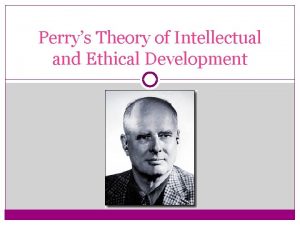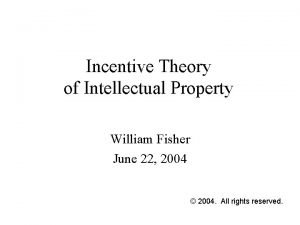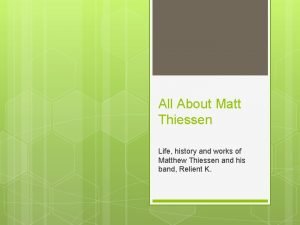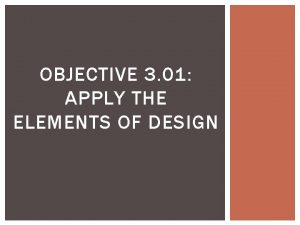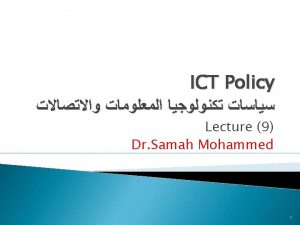William G Perry Jr Forms of Intellectual and













- Slides: 13

William G. Perry, Jr. Forms of Intellectual and Ethical Development in the College Years

The Life of William G. Perry, Jr. Born in Paris, France in 1913. Died January 12 th, 1988. B. A. in English and Greek from Harvard in 1935 M. A. in English in 1940, also from Harvard 1947 - Founded the Bureau of Study Counsel at Harvard: a student center for counseling and tutoring. Published Forms of Intellectual and Ethical Development in the College Years in 1970. Received lifetime achievement award from the Massachusetts Psychological Association

Perry’s Study Studied the intellectual development of college students Longitudinal Study Interview-style questioning: wanted students to give their own accounts of college in their own terms Then a panel of judges would rate the unedited transcripts of the interviews using Perry’s scheme of 9 positions

His Scheme of Intellectual Development 9 positions 1. Polar terms- we-right-good vs. others-wrong-bad 2. Diversity of opinion and uncertainty are seen as confusion in 3. 4. 5. 6. 7. 8. 9. poorly-qualified authorities Diversity and uncertainty are legitimate but also due to not finding the answer yet. “Anyone has a right to their own opinion. ” Knowledge and values are contextual and relativistic. Orientation of self in a relativistic world through personal commitment of some sort. Student makes an initial commitment in some area. Student experiences implications of that commitment. Affirmation of identity.

His Scheme Cont. While going through the positions students will also: Temporize- delay in some position, hesitant to move on Escape- Exploits opportunity for detachment around Positions 4 & 5. Retreat- Entrenched in Dualism- around positions 2 & 3. 4 Generalized Levels Dualism (1 -2) Multiplicity or Complex Dualism (3 -4) Relativism (5 -6) Commitment to Relativism (7 -9)

Dianne Bateman & Janet Donald “Measuring the Intellectual Development of College Students: Testing a Theoretical Framework” Testing the ability of Perry’s Scheme to measure the intellectual development of college students. Two possible levels or general positions that students take towards knowledge The first is that knowledge consists of facts and data, and that professors should supply them. The second is that knowledge is a quest in which students have responsibility for their own learning, and are expected to be able to judge the validity of arguments and to identify and defend their own point of view.

My Study: Hypotheses Hypothesis 1: The majority of freshman students surveyed will be in the dualistic level of intellectual development. Hypothesis 2: There will be a significant difference between the intellectual levels of students and faculty members.

The How: Online Survey Sent students and faculty members an online survey through the website Survey Monkey. Participants had to consent to participating, indicate whether they were a student or faculty member, then they could complete the quiz. EX:

My Results: Percentages of Agreement and Disagreement Levels of Development Agreement % Avg. Disagreement % Avg. Dualism 46. 5% 53. 5% Multiplicity 53. 2% 46. 8% Relativism 76. 4% 23. 6% Commitment to Relativism 78. 2% 21. 8%

# 1 2 3 4 5 6 7 8 9 10 11 12 13 14 15 D 1 A N A A A A A N N A N D 2 A A D A N SA SA SD D N N M A 3 C 4 N N A A D D N A A SA A D A A SA A A SD A SA SA N A R 5 N D SA SA A A A D A SD SA SA A C 6 A D A A A SA A N A A A C 7 A NO A A N A A SA N D A A D 8 N D N A A A D A N N A N SD D N R 9 N A A SA A A D A A SD A SA D A A R 1 0 M 12 R 1 4 C 1 6 D 1 7 M 19 M 20 A SA SA SA A N SA SA N A SA A D N SA A A A A N D SA SA A A SA N N A SA D A SA A N A SA SA A A A A D N N D SA A SA N D D N N SA A D N D SA A SA N SA A N N SA SD D N D SA N D D SD SA D N

Percentages of Students in each level Level % of Participants Dualism 13. 3% Multiplicity 46. 7% Relativism 40% Commitment to Relativism 0%

I was wrong; I’ll admit it. I was wrong about my first hypothesis. Most students were actually at the level of multiplicity. However, the majority of students surveyed were in the lowest two levels of intellectual development. So… I cannot accurately test my second hypothesis, however, the professor has reached the level of Commitment to Relativism based on my assessment. He/she is two levels higher than 60% of his students.

Implications of Study Assuming that we could come up with valid test based on Perry’s Scheme… Should we test students on their intellectual development before they enter college? Could there be a correlation between schooling and stage when entering college? Should we expect the majority of incoming freshman to be generally dualistic in their thought processes? Should we change curriculum at the college and high school levels? Should we be trying to combat dualism or is it necessary for proper development?
 Perry’s theory of intellectual and ethical development
Perry’s theory of intellectual and ethical development William g perry
William g perry Theories of intellectual property william fisher
Theories of intellectual property william fisher They would contracted form
They would contracted form Strong and weak forms of auxiliary verbs
Strong and weak forms of auxiliary verbs Matt thiessen
Matt thiessen Why are related forms more agreeable than unrelated forms
Why are related forms more agreeable than unrelated forms Why are related forms more agreeable than unrelated forms
Why are related forms more agreeable than unrelated forms Why are related forms more agreeable than unrelated forms?
Why are related forms more agreeable than unrelated forms? Kalani perry
Kalani perry Perry glasser
Perry glasser Onomatopoeia roar
Onomatopoeia roar Dr perry neurologist
Dr perry neurologist Onomatopoeia in the song roar
Onomatopoeia in the song roar
